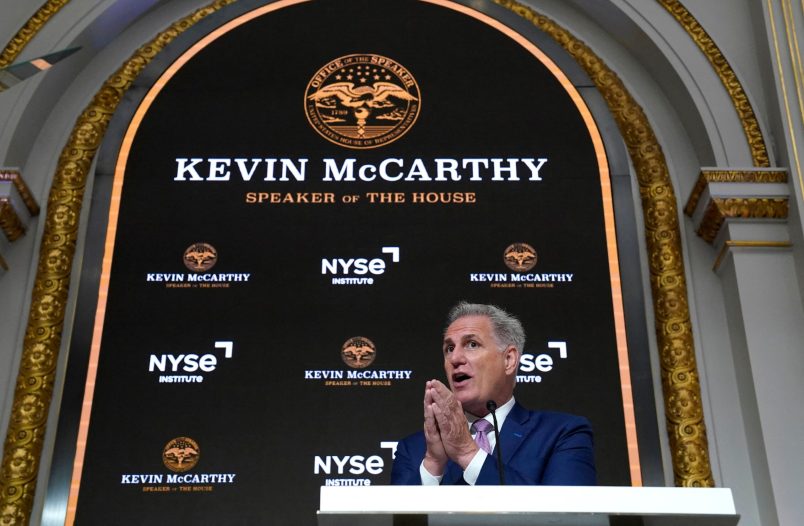In a much ballyhooed speech on the impending debt ceiling at the New York Stock Exchange Monday morning, House Speaker Kevin McCarthy (R-CA) … delivered essentially the same remarks he’s been giving for months.
McCarthy criticized President Joe Biden for not meeting with Republicans since February, and not acceding to their demands to negotiate terms they still haven’t managed to produce. His speech was, as usual, devoid of details about those spending hard lines: He vaguely mentioned work requirements, reducing spending to fiscal year 2022 levels, limiting future growth of spending during the next decade to one percent and not raising taxes.
That’s been the persistent theme of his debt ceiling remarks, and makes transparent the bind he’s in: He can’t present a detailed list of negotiating stances to try to coerce the administration into forking over concessions, because he can’t come up with any that the whole Republican House (much less their Senate counterparts) would support. Many of the measures floated — mostly various iterations of cutting domestic benefit programs — are also extremely unpopular with voters.
So instead, McCarthy has remained as vague as possible, still loath to let the threat of economic catastrophe pass without leveraging a win from the Biden administration.
“Let me be clear. A no-strings-attached debt limit increase will not pass,” he said Monday.
The White House, for its part, has hewed closely to the lessons learned during the Obama administration. Then, the administration did negotiate with bad-faith Republicans, giving them some spending cuts and incentivizing them to play chicken with the debt ceiling every time the limit is approached. It’s created an easy formula for Republicans — claim to be motivated by fiscal responsibility and demand a political win they’d never be able to achieve through regular legislative order.
The slim House margins are complicating this iteration of the gambit for McCarthy. He’s already conceded that he won’t touch Medicare or Social Security and vowed not to raise taxes. That leaves him with a limited universe of programs to target. One of his proposals would make it more difficult for people to participate in the Supplemental Nutrition Food Assistance Program, or SNAP (formerly known as food stamps), per a Politico report replete with quotes from skeptical Republicans.
During his speech, McCarthy said that House Republicans will pass their own debt ceiling hike to raise it into next year, “save trillions,” and curb inflation without cutting Social Security or Medicare. It’s an easy pitch to make when none of those spending measures are enumerated.
Just after the speech, he was asked on CNBC if his “proposal” has the support of his party.
“I think I have the support of America,” he responded. “I’ll get the party behind it but more importantly, what is wrong with sitting down on both sides and finding a responsible, reasonable way?”
The White House preempted McCarthy’s Monday speech with a statement.
“A speech isn’t a plan, but it’s clear that extreme MAGA Republicans’ wish lists will impose devastating cuts on hardworking families, send manufacturing overseas, take health care and food assistance away from millions of people, and increase energy costs — all while adding trillions to the debt with tax cuts skewed to the super-wealthy and corporations,” Deputy Press Secretary Andrew Bates said.
Senate Majority Leader Chuck Schumer (D-NY) will bookend the speech later this afternoon with a press conference urging McCarthy to “stop the partisan games and show us his plan to avoid defaulting on our national debt.”







God he’s a fucking joke.
He had the nerve to go to Wall Street and try to BS people who know how Finance works.
McCarthy’s “price” is for the US to default on its debt obligations and be able to blame Biden and the Democrats for the resulting fall-out.
The only question is whether there are any House Republicans left with the courage to put country above party and vote for a clean debt ceiling raising bill.
It’s quite simple. All he wants is for the department of justice to indict MTG, Gaetz, bobes, and Gym Jordan and get them out of his life. But he can’t say that.